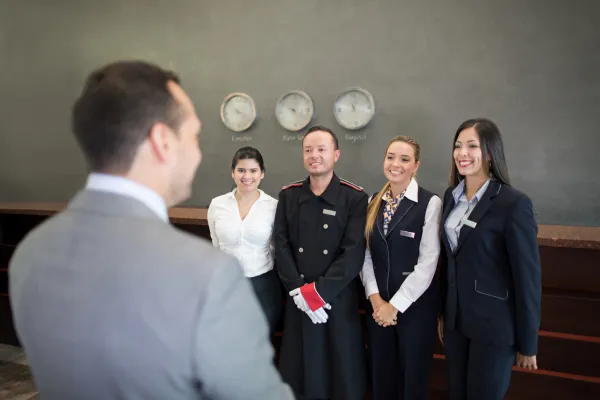
Hospitality Staffing in Dubai: Meeting Peak Season Demands with Strategic Hiring
Dubai's hospitality sector shattered records in 2024, welcoming 18.72 million international visitors—a 9% surge from the previous year. This growth, whilst impressive, creates intense staffing pressures during peak seasons that can make or break operational success.
With tourism contributing AED 236 billion to the UAE economy and representing 12% of GDP, the stakes for maintaining service excellence have never been higher. As Dubai maintains its position as the world's third most visited city, hospitality businesses must master the art of scaling their workforce strategically.
Understanding Peak Season Pressures
Dubai's tourism operates on distinct seasonal patterns. Winter months (October-March) see occupancy rates soar to 78%, with special periods like Diwali reaching 82.2%. This seasonal surge creates immediate staffing bottlenecks across housekeeping, food and beverage, and front desk operations.
The challenge intensifies when considering market dynamics. Hospitality salaries in the MENA region have risen 11% over three years due to aggressive hiring and cost-of-living adjustments. With Western Europe contributing 3.74 million visitors annually as Dubai's largest source market, properties need multilingual staff capable of delivering premium experiences.
The mathematics are stark: a 200-room hotel with an average daily rate of AED 690 generates over AED 100,000 daily during peak periods. Understaffing that reduces guest satisfaction by just 5% can cost hundreds of thousands in lost repeat business and referrals.
The Cost of Reactive Hiring
Traditional last-minute hiring approaches prove disastrous during Dubai's peak seasons. Scrambling for staff when occupancy spikes leads to compromised quality standards, overworked existing employees, and ultimately, damaged guest experiences that can take years to recover from.
The ripple effects extend beyond immediate operations. Burnout amongst existing staff increases turnover rates, creating a vicious cycle of constant recruitment. In an industry already facing retention challenges, peak season stress can devastate team stability and service consistency.
Strategic Workforce Planning Solutions
Successful Dubai hospitality operators have abandoned reactive hiring for strategic workforce planning that begins months before peak season. This proactive approach involves three critical components:
Predictive Planning: Analysing historical data, booking patterns, and market trends allows accurate forecasting of staffing needs. Understanding that Dubai expects 15,000 new direct hospitality jobs by 2027, forward-thinking operators build relationships with talent sources early.
Talent Pipeline Development: Rather than competing for limited candidates during peak periods, smart operators maintain year-round relationships with hospitality schools, seasonal workers, and specialised recruitment agencies. This ensures access to pre-vetted candidates when demand spikes.
Cross-Training Programmes: Developing multi-skilled employees provides operational flexibility crucial during unexpected demand surges. When housekeeping staff can support F&B operations or front desk agents can assist guest relations, properties adapt seamlessly to changing needs.
Maintaining Quality at Scale
The biggest challenge in seasonal hiring is preserving Dubai's reputation for service excellence whilst rapidly scaling teams. This requires standardised assessment protocols that quickly identify candidates with the right skills, attitude, and cultural fit for serving Dubai's diverse international clientele.
Accelerated onboarding programmes become essential, combining digital learning platforms with hands-on mentoring. These intensive modules focus on essential skills and property-specific procedures, enabling new hires to contribute effectively within days rather than weeks.
Quality control measures must adapt to high-volume scenarios through buddy systems, frequent performance check-ins, and feedback loops that identify issues before they impact guest experiences.
Technology-Enabled Efficiency
Modern recruitment increasingly leverages technology to streamline processes. AI-powered platforms can process hundreds of applications simultaneously, whilst video interviewing enables efficient initial screenings. Automated reference checking systems verify qualifications within hours, maintaining quality standards during rapid hiring.
Performance analytics provide insights that improve future hiring decisions, helping properties focus on the most effective recruitment channels for long-term success.
Future-Proofing Hospitality Staffing
With 1,685 new luxury rooms expected in 2025 (36% of total new supply), competition for skilled staff will intensify. Properties that view strategic staffing as a competitive advantage rather than a seasonal challenge will thrive in Dubai's evolving market.
The hospitality businesses succeeding in Dubai's competitive landscape implement proactive workforce planning, maintain quality during rapid scaling, and leverage technology for efficiency. Most importantly, they recognise that partnership with specialised recruitment agencies provides the expertise and scalability needed to meet peak season demands whilst preserving the service excellence that defines Dubai's global reputation.
In Dubai's dynamic hospitality market, strategic staffing isn't just about filling positions—it's about building the foundation for sustained success in one of the world's most competitive tourism destinations.